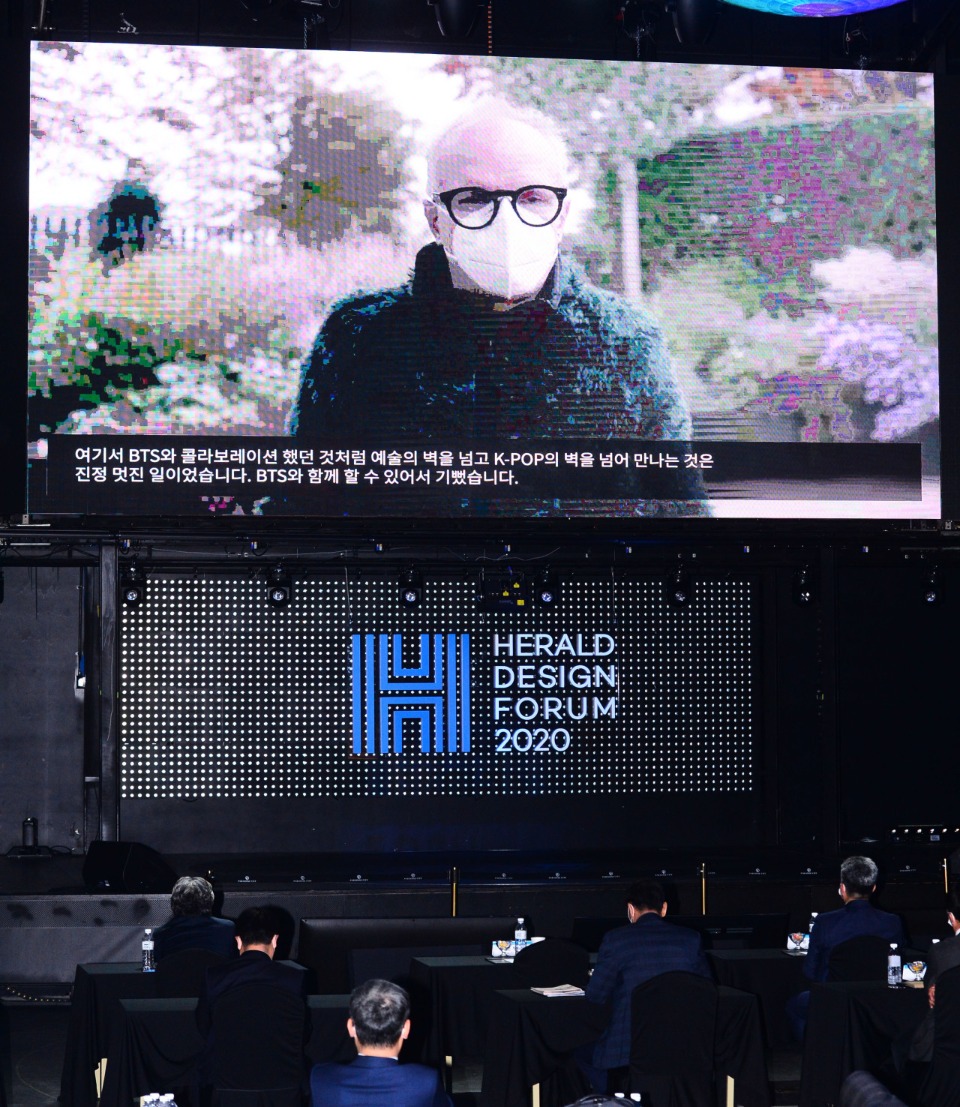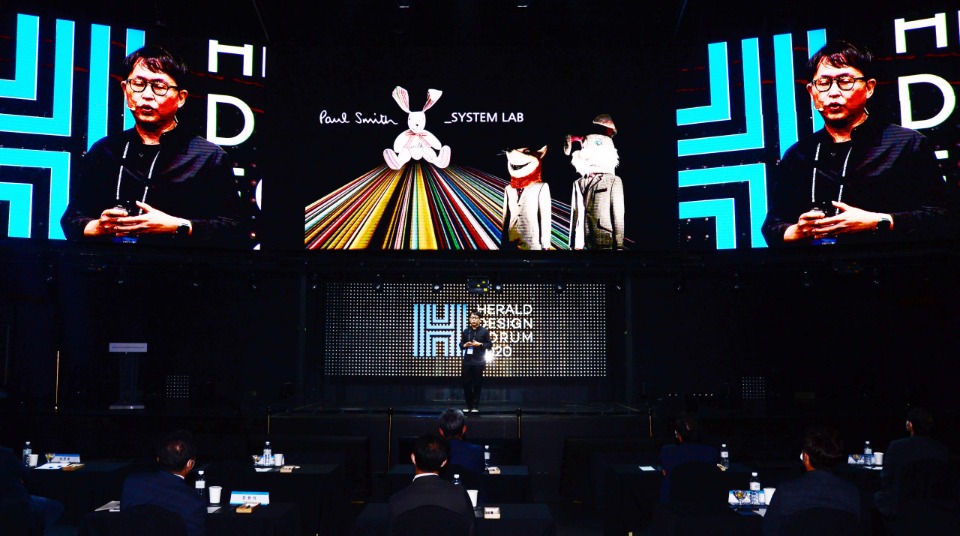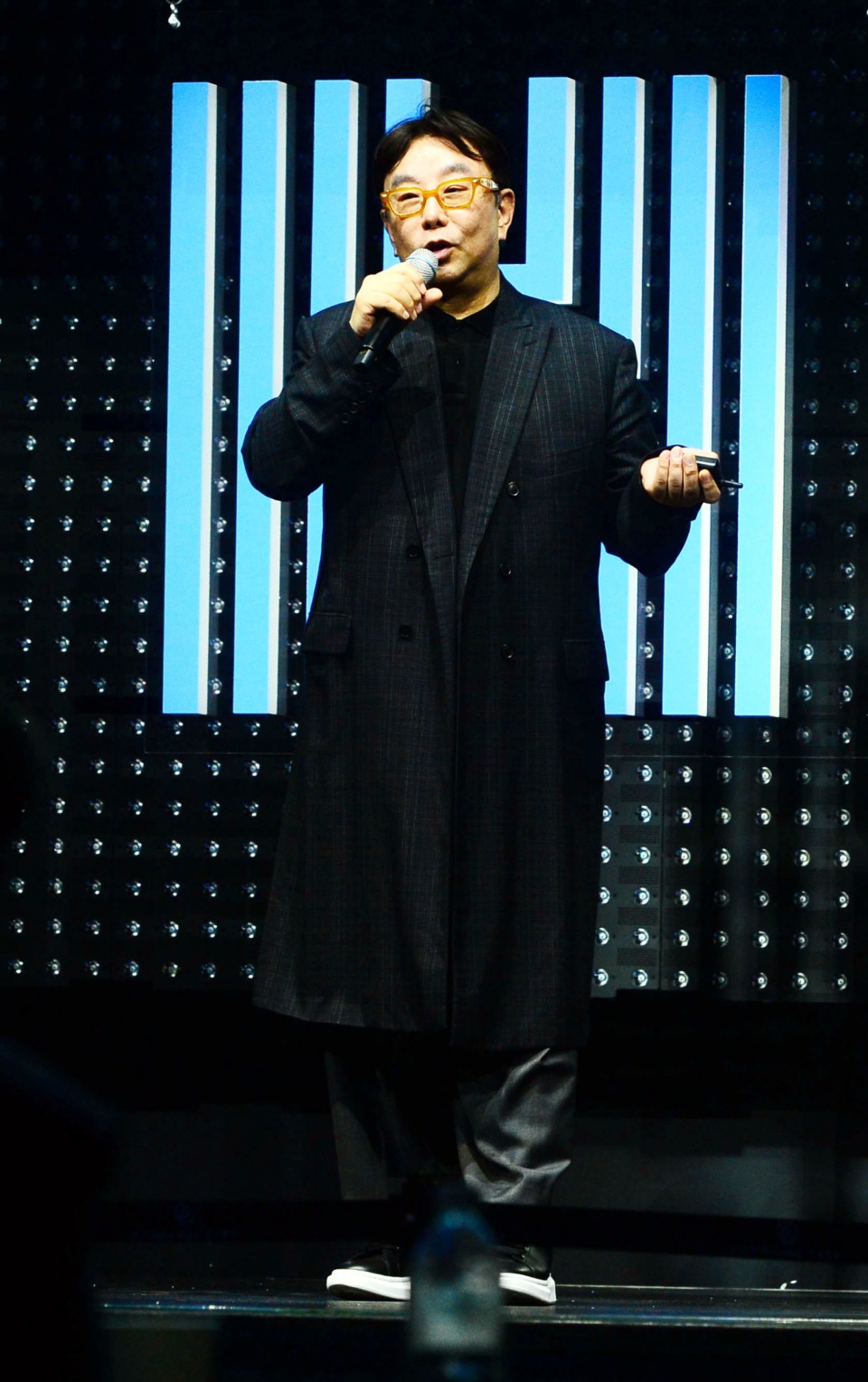The 2020 Herald Design Forum was held Thursday, sharing design ideas that envision the next 10 years, at Paradise City Chroma in Incheon.

Hans Ulrich Obrist gives an online lecture at the Herald Design Forum 2020 in Incheon on Thursday. (Park Hae-mook/The Korea Herald)
Hans Ulrich Obrist gives an online lecture at the Herald Design Forum 2020 in Incheon on Thursday. (Park Hae-mook/The Korea Herald)
At the event, Hans Ulrich Obrist, an influential art curator, delivered a speech titled “Toward a New Era of Social Imagination,” which also streamed online.
The Swiss-born curator shared his thoughts on the role of art and design. Obrist is the director of the Serpentine Galleries in London, which boasts a wide selection of contemporary art works. He was the first curator to be listed among the 100 most influential people in the global arts scene by British art magazine ArtReview.
“As a Kunsthalle (art gallery), the Serpentine Galleries strive to break down walls and create different contexts,” Obrist said in a video recorded at Kensington Park, where the art establishment is located.
The artist is recognized in Korea for having led the Connect art project with K-pop juggernauts BTS.
Obrist stressed the need to “go beyond the two dimensions of screen,” especially in a contactless society hit by the COVID-19 pandemic.
“This year has been a year of big change for museums. We could not welcome visitors until August,” he said. “Most projects are led digitally.”
According to Obrist, augmented reality may be a better way of enhancing art communication, as virtual reality requires extra gear. The Serpentine Gallery changed Chinese artist Cao Fei’s exhibition from VR to AR, allowing people at home to enjoy the works.
The art figure mentioned the importance of “civic curation,” which means involving a wider range of the public in communicating through art.
“We should take the exhibition to visitors rather than bringing visitors to the exhibition,” he said.
“We are living in a world of globalization -- maybe the most violent form of globalization which destroys environment, leads to the disappearance of species, languages and culture,” he said.
He wrapped up the speech with a quote by poet Etel Adnan: “The world needs togetherness, not separation; love, not suspicion; a common future, not isolation.”

Architect Kim Chan-joong speaks during the Herald Design Forum (Park Hae-mook/The Korea Herald)
Architect Kim Chan-joong, head of The_System Lab, a Seoul-based architecture firm, followed with a speech titled “The_System Lab Report: Making Story.”
“The name of our company refers to the existence of respective systems. We assume that every project has its own best solution. It is our job to find the solution, building up respective logic fit for each system,” Kim said in an in-person speech.
The winner of numerous architecture awards, Kim has worked on the Gangnam Commercial Building, Hana Bank PLACE 1, the new JTBC building, the Cosmos Resort on the island of Ulleungdo and a greenhouse at Seoul Botanic Park.
The star architect stressed the importance of sustainability.
“Even after a long time, buildings remain in their place, and tell their own story. Though online digital media overflows, the story of architecture which creates physical space is important,” he said.
“We are now facing a situation which we have never experienced before. Who knew? Now, visually unusual phenomena are accepted as a part of daily life,” he said, referring to how the COVID-19 pandemic has changed our lives.
Due to the virus crisis, more employees have experienced working from home than ever before, which will eventually change the landscape of office architecture and construction.
He asserted that the logic of construction should continue to evolve in response to changing societies.
“We usually separate districts into commerce, office and residential areas. Reconfiguration will be a key, dividing everything into small segments and combining them into something else. That is the only way to establish a flexible system for reconfiguration,” Kim said.

Creative director Jung Ku-ho addresses the Herald Design Forum. (Park Hae-mook/The Korea Herald)
Following a lunch break, creative director Jung Ku-ho took the podium. Jung is an established fashion designer here. He led Seoul Fashion Week for four years as the executive director, introducing Korea’s fashion scene to the global fashion industry.
In his speech, “Design Thinking,” Jung focused on his design philosophies.
“I created a 10-year plan for myself, for my own evolution. Though I am mostly known as a fashion designer, that is not how I began my career. I started with graphic designing, worked in F&B (food and beverages), interior and fashion industries and moved on to works related to the performing arts,” Jung said at the in-person presentation.
“But for trends, I look at 30 years. A decade is a relatively short time to predict trends. Trends move in a 30-year cycle,” he said.
The designer stressed the importance of understanding evolutions, reading flows, knowing one’s own surroundings and eventually finding oneself.
“I have been investing the half of my life for the future. A person who lives with question marks lives a different life from a person who lives with exclamation marks. I search and find answers with question marks and dig up meanings in the process,” Jung said.
By Im Eun-byel (silverstar@heraldcorp.com)